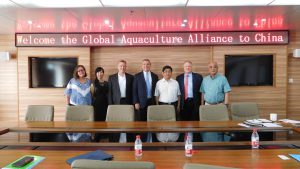Evolving GAA Partnerships Point To GOAL 2016 In China
China is the world’s leading aquaculture producer, and now one of the leading global aquaculture importers, as well. Although China’s shrimp-farming industry has been experiencing reduced output due to production problems, the industry is striving to improve itself through improved practices and policies.
 A team of Global Aquaculture Alliance representatives visited China in early August to offer assistance in these efforts. The successful initiatives with Chinese organizations that arose during the meetings pointed to that country as the likely host for GOAL 2016.
A team of Global Aquaculture Alliance representatives visited China in early August to offer assistance in these efforts. The successful initiatives with Chinese organizations that arose during the meetings pointed to that country as the likely host for GOAL 2016.
NEC
GAA President George Chamberlain, Relationship Manager Sally Krueger, Vice President of Education and Outreach Steve Hart and Market Development Manager for Asia Jane Bi met with Wei Baozhen, director of the National Fishery Technical Extension Center (NEC) to discuss how GAA could assist the huge Chinese aquaculture industry, especially through Best Aquaculture Practices (BAP) certification and new online training being developed by the Responsible Aquaculture Foundation (RAF). NEC is the agricultural extension service of China, which has 40,000 extension agents for aquaculture.
Chamberlain explained the benefits of BAP certification and proposed its application in China to improve food safety for the domestic aquaculture sector. He also described the RAF online education program that is entering development. Although NEC has a certification program under way, as well as an education program focused on disease diagnosis, Wei said NEC is looking at collaboration with GAA. Such a partnership would be very effective in reaching the Chinese aquaculture industry.
CSIQ
A meeting with the China Society of Inspection and Quarantine (CSIQ) was presided over by CSIQ Vice Chairman Wei Chuanzhong and attended by a group of CSIQ and Administration of Quality Supervision, Inspection and Quarantine (AQSIQ) department heads. CSIQ is an independent body whose mission is to serve as a bridge among governments, corporations and inspection bodies to facilitate food trade.
Wei expressed his group’s interest in establishing a cooperative partnership with GAA. Areas of cooperation could include working with AQSIQ on BAP certification, training in collaboration with the Chinese group Global Union of Agricultural Products and Food Inspection, and co-hosting of GOAL. GAA’s Steve Hart will work with Deputy Director General Han Jianping of the AQSIQ Department of International Cooperation to draft a memorandum of understanding that will formalize the partnership.
CAPPMA
Hart and Bi met with Executive Vice President Dr. Cui He of the China Aquatic Products Processing and Marketing Alliance (CAPPMA) to share updates on GAA’s BAP program and online education through the RAF. GAA and CAPPMA signed a memorandum of understanding in 2014 to advance responsible aquaculture through the exchange of information and research.
Cui said he was very interested in having an online database that would bring clarity to the various seafood certifications that are currently available. He also suggested that BAP schedule a weeklong program in China to help broaden its exposure within the domestic market. Cui expressed interest in the online education platform and indicated he would help locate Chinese facilities at which to pilot test the platform. He also suggested that GAA host a sustainability forum, perhaps around an existing seafood trade event.
APCC
While in China, Hart and Bi also met with Mu Tong of the All China Federation of Industry and Commerce’s Aquatic Production Chamber of Commerce (APCC). Mu indicated APCC wants to help its members be leaders of sustainability in China by improving process efficiencies and product quality. She said APCC members would be a good fit for BAP and so would like to explore ideas for getting better incorporation of BAP within the APCC membership. Mu also said she would assist representatives of GAA in meeting with members to review and pilot test the aquaculture education platform.
In addition, Mu proposed that GAA help China’s aquaculture industry and government adopt policies that are more widely accepted in other areas. She specifically mentioned adoption of crop insurance for aquaculture and better food safety policies.
GOAL
GAA is planning to take GOAL 2016 to China, the global “center” of aquaculture. The country boasts a huge diversity of farmed species and thousands of organized producers. Its burgeoning domestic aquaculture sector is now changing the fabric of the industry. The various groups with which GAA met approve of the idea and indicated they would support the event in direct and indirect ways. These could range from potential sponsorship and logistical support to increasing participation and providing program content.


